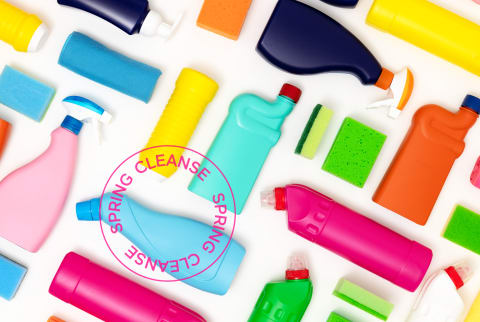Advertisement
4 Signs It's Time To Toss Your Cleaning Products (& How To Do So Safely)


We know to give our pantry, fridge, and beauty cabinet a skim to check for expired products every so often—but what about our collection of cleaning supplies? Turns out, those shouldn't be sitting under your sink for years on end, especially if they're natural formulas that skip certain harsh, but effective, chemical preservatives. Here's what to know about spring cleaning your cleaning cabinet.
How long do cleaning supplies last?
Green cleaning products still use preservatives to stop microbial growth, but they tend to max out around two years—after which a product will start to go bad. Enzyme cleaners usually expire even faster. But not to worry! Since you're not eating your natural cleaning products or lathering them all over your skin (I'd hope), they usually don't pose any kind of health threat when their shelf life runs out. You might just notice that their scent starts to fade or they don't work as well as they used to.
"Expired natural cleaning products would seldom pose a threat besides not cleaning as well since their efficacy is affected over time," Angela Bell, a Grove Guide at natural cleaning marketplace Grove Collaborative, tells mbg. "Keep in mind the expiration is usually a 'Best-by Date.' This means there is some leeway in that timeline, so give it a try before you toss it on the exact date stamped on the bottle."
Sacha Dunn, the founder of plant-based cleaning company Common Good, agrees, adding that she's found products will often last longer than their shelf life says they will. "They might lose a little bit of efficacy, but mostly, they'll just have cosmetic changes," Dunn explains, adding that cleaners scented with essential oils might darken over time as the oils oxidize, or liquid cleaners might become more viscous with age.
Some signs it's time to toss yours.
OK, so you can usually feel comfortable using a natural cleaning product past its expiration date. But there are a few signs that you should toss it out and start new, either because the product won't work anymore or because it could do more harm than good:
- Mold growth: If you notice anything funky growing in your bottle, "that would be a clear reason to get rid of it," says Dunn.
- Weird smells: "Especially with natural products, you can smell the surfactants start to spoil," says Dunn. She says this will smell like rancid canola oil or olive oil. While not necessarily dangerous, these won't be pleasant to use.
- Split liquids: "The liquid may separate or become cloudy," says Bell. "Sometimes a good shake can fix this separation, but, if not, it might be time to replace."
- Expired disinfectants: If you live with a sick or immunocompromised family member or are worried enough about the spread of germs at home to use disinfectant cleaners, you'll want to pay attention to their expiration date. After that, they could lose their germ-killing power and could give you a false sense of security.
How to keep your products fresh for longer.
To help your cleaners live up to their maximum shelf life, it's important to store them properly. High temperatures can cause products to spoil faster, so Dunn recommends keeping yours in a dark room-temperature area like a sink or cupboard, out of the way of direct sunlight.
Into low-waste cleaning and using refillable bottles to store your supplies? That's great—you'll just want to be mindful about how you're cleaning those bottles out. If you're rinsing from the tap, let them air dry completely before adding your next round of cleanser, as tap water is full of bacteria. DIYers will also want to keep this in mind when mixing their own cleaning concoctions; distilled water tends to make a more shelf-stable base than tap.
How to safely dispose of cleaning products.
When you have spoiled products on your hands, it's important to dispose of them responsibly. If your cleaner is made using biodegradable ingredients (it should say so on the label or website), getting rid of it is easy: Simply wash it down the sink with some water and you won't have to worry about it persisting in the environment.
If you're disposing of toxic bleach-based products, the process is more complicated. "If your cleaning products contain words like hazard, danger, warning, or caution, they likely can't just be tossed out in the trash or poured down the sink," explains Marilee Nelson, environmental consultant and co-founder of Branch Basics cleaners.
In that case, you'll want to check out the Earth911 database to look for safe disposal sites near you. If you're spring cleaning and itching to get them out quickly, store in an airtight container and stow them away until you can get them to a site near you. It's a pain, but it's important.
"Taking responsible disposal seriously can have a major impact on our environment, as what ends up in our trash ends up in our groundwater and oceans—and eventually finds its way back into our lives in our food and drinking water," says Nelson.
One final thing to remember: When you're disposing of multiple cleaning products, do so one at a time and don't mix them together in the sink or trash. Certain types of cleaners don't play nicely with each other (bleach and vinegar in particular) and can cause noxious gas to form when combined.
The bottom line.
Most cleaning products you'll find in stores will stay shelf-stable for a few years before they start to break down. It's usually safe to keep using natural cleaners after their best-by dates, but if you notice any mold or weird smells emanating from your bottles, you'll want to toss them out (responsibly, of course!).
Watch Next
Enjoy some of our favorite clips from classes
Enjoy some of our favorite clips from classes
What Is Meditation?
Mindfulness/Spirituality | Light Watkins
Box Breathing
Mindfulness/Spirituality | Gwen Dittmar
What Breathwork Can Address
Mindfulness/Spirituality | Gwen Dittmar
The 8 Limbs of Yoga - What is Asana?
Yoga | Caley Alyssa
Two Standing Postures to Open Up Tight Hips
Yoga | Caley Alyssa
How Plants Can Optimize Athletic Performance
Nutrition | Rich Roll
What to Eat Before a Workout
Nutrition | Rich Roll
How Ayurveda Helps Us Navigate Modern Life
Nutrition | Sahara Rose
Messages About Love & Relationships
Love & Relationships | Esther Perel
Love Languages
Love & Relationships | Esther Perel


















